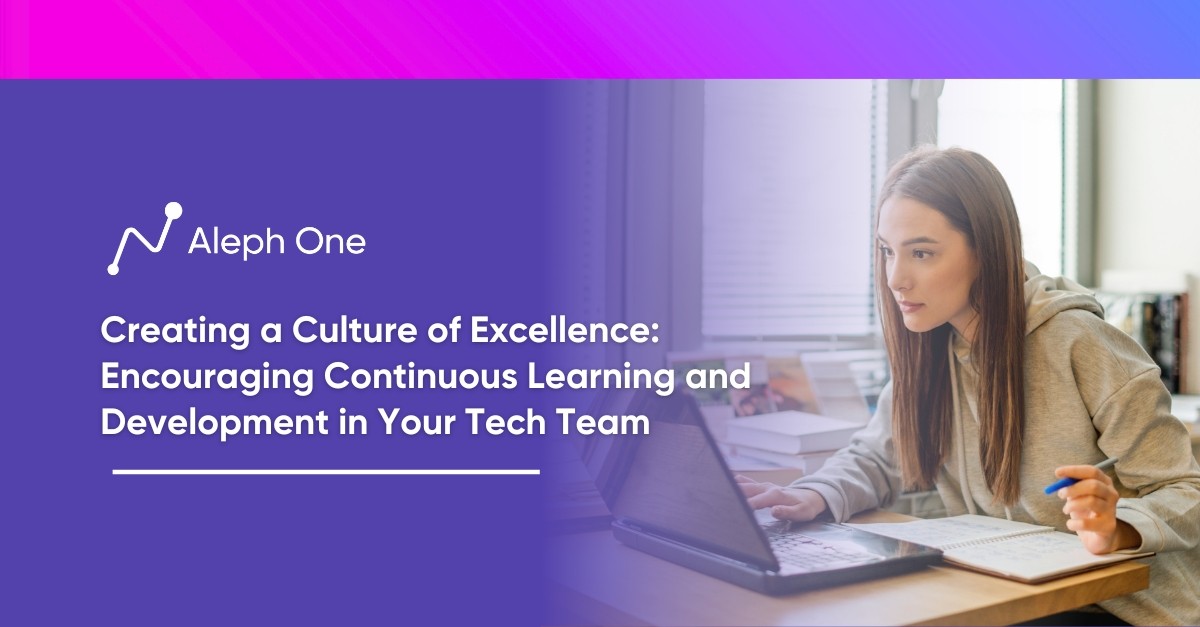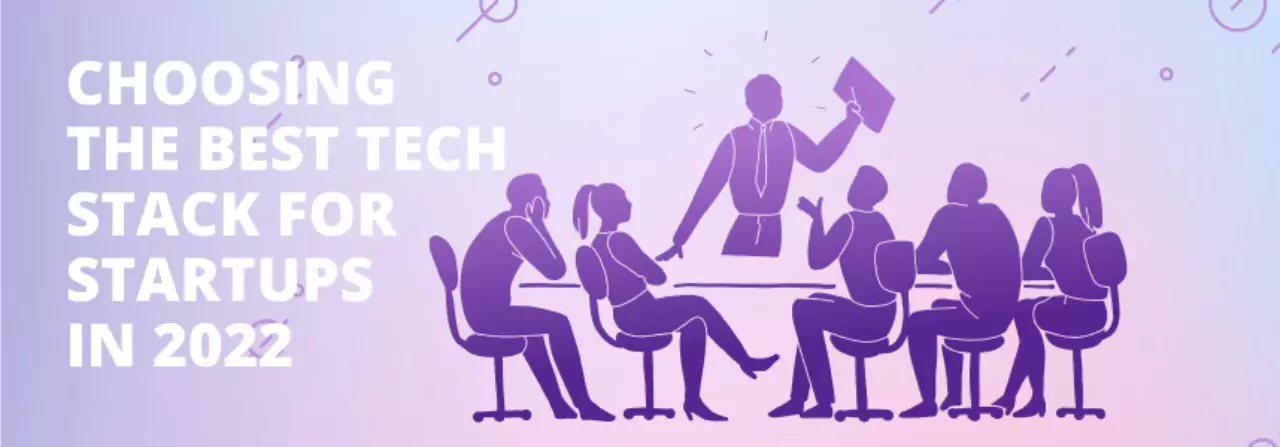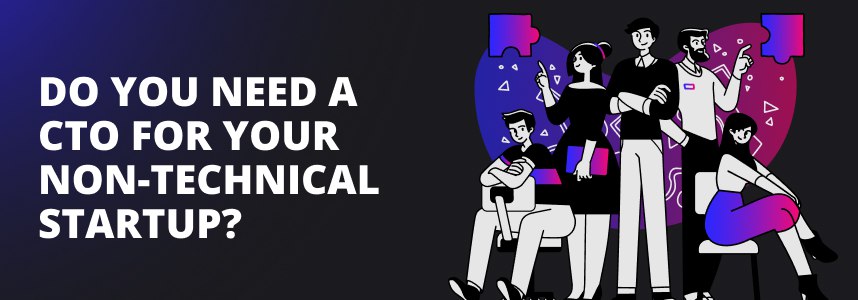Let’s work together to build something amazing. Share your project details and our team will reply to figure out the next steps to your success.

In today’s tech realm, where evolution is relentless, the survival of companies hinges on an unwavering commitment to continuous learning. This practice has transformed from a luxury to a critical element that drives employee loyalty, customer satisfaction, and revenue growth. While investing in a learning culture might seem daunting, the rewards in retention, commitment, and growth far outweigh the costs. In the competitive tech landscape, continuous learning isn’t an option; it’s the force that propels your company ahead.

Why Continuous Learning Matters More Than Ever
Skills and knowledge become outdated quickly in today’s fast-changing tech landscape. Teams and companies that stop learning and improving are left behind. Continuous learning directly impacts key metrics like employee retention, customer satisfaction, and revenue growth.
Continuous Learning Plays a Key Factor for Employees When Deciding Where to Work
According to LinkedIn’s 2020 Workplace Learning Report, 94% of employees would stay at a company longer if it invested in their career development. Continuous learning is now a key factor for employees when deciding where to work. Providing opportunities for employees to expand their skills makes them feel valued and invested in the company’s success.
This also translates directly to improved customer experiences. Employees with up-to-date knowledge can build innovative products, provide better support, and solve customer problems more effectively. This leads to higher customer satisfaction and loyalty.
Learning and Development Programs Drive Revenue Growth
Revenue growth is another benefit of continuous learning. Companies that invest in employee development build a workforce with skills that match current and future business needs. Employees can work more efficiently and spot new opportunities to drive revenue. Studies show that learning and development programs can drive over 200% ROI in revenue and productivity.
Lessons from Tech Giants
Major tech companies like Google, Netflix, and Adobe invest heavily in learning programs for these reasons. At Google, employees spend 80% of their time on the job learning and improving. Netflix’s company culture revolves around continuous learning, providing employees unlimited access to online courses and learning resources.
The Long-Term Benefits of Building a Learning Program
While the costs of building a learning program may seem high, the long-term benefits to employee retention, customer loyalty, and revenue growth provide an excellent return on investment. Continuous learning could set you apart in today’s highly competitive tech landscape. Creating a culture where employees constantly improve and innovate will future-proof your company for technological changes and ensure long-term success. Continuous learning must be an ongoing priority, not a one-time initiative.
The Cost of Complacency: A Lesson from Blockbuster
Blockbuster Video is a cautionary tale of how complacency and a failure to learn continuously can lead to irrelevance and business failure. In the early 2000s, Blockbuster was the dominant video rental company, with over 9,000 stores worldwide and a market value of over $5 billion. However, Blockbuster failed to adapt to the rise of DVD-by-mail and streaming services. While competitors like Netflix pioneered DVD-by-mail and invested heavily in streaming video on demand, Blockbuster was slow to follow. By the time Blockbuster launched its own DVD-by-mail service, Netflix had already captured the market.
Failure to Adapt to Changing Tides
Blockbuster’s complacency came from its initial success and market dominance. For years, it generated huge profits from its brick-and-mortar stores and relied on its existing business model. However, customer viewing habits were changing rapidly. Rather than learning from these changes and evolving with its customers, Blockbuster stuck with what had always worked. It failed to see the threat new technologies like streaming video and DVD-by-mail posed to its business.
Future-Proof Your Business Through Constant Learning
By 2010, Blockbuster’s revenues had declined by over 40%, and it filed for bankruptcy. Today, only a single Blockbuster store remains open in the U.S. Blockbuster’s story highlights why continuous learning and adapting to change is vital, especially in technology-driven industries. Companies that rest on their laurels, stick to outdated business models, and fail to learn from customer needs and technology changes will not survive for long. Staying on the cutting edge of industry trends through constant learning is the only way to future-proof your business. Complacency will only lead down the path of irrelevance, much like Blockbuster.
How to Build a Culture of Continuous Learning
To build a culture of continuous learning in a tech team, leaders must prioritize learning and provide the necessary support and resources. Some key steps include:
Allocate a Learning Budget and Time
Provide funding and paid time off for employees to pursue learning opportunities like online courses, conferences, and workshops. This shows you value continuous learning.
Offer Learning Incentives and Rewards
Consider offering rewards like bonuses, gift cards, or extra paid time off when employees complete learning programs or milestones. This positive reinforcement will motivate teams to keep learning.
Promote Growth Mindset
Praise effort and progress, not just outcomes or achievements. Encourage teams to see abilities and intelligence as things that can be developed through learning, not fixed traits. A growth mindset is essential for continuous improvement.
Lead by Example
Executives and managers should visibly participate in learning activities themselves. This helps establish learning as an essential part of the culture and work. Share what you learn with your teams as well.
Provide Mentoring and Coaching
Mentoring programs and coaching are highly effective for continuous learning. They provide guidance and accountability and help teams develop skills through experience.
Offer Job Shadowing
Job shadowing, where employees observe others in different roles, helps expose teams to new skills and ideas. It also boosts cross-functional understanding, which aids collaboration and innovation.
Host Hackathons
Hackathons, where teams come together to solve problems or build prototypes, are a great way to facilitate learning through experimentation and collaboration. They encourage creativity and thinking outside the box.
Reward Knowledge Sharing
Recognize and reward employees who share their knowledge with others through activities like teaching, mentoring, and internal education. Knowledge sharing amplifies learning across the organization.
Continuous learning requires ongoing effort and commitment. But by prioritizing learning, providing necessary resources and support, and rewarding learning behaviors, you can build a culture where your tech team is constantly improving and innovating. The long-term benefits to your business will be huge.
Promoting a Growth Mindset Through Micro-Learning
Micro-learning, or short-form learning, promotes a growth mindset in tech teams. When employees are exposed to new concepts and ideas in bite-sized chunks, it sparks their curiosity and interest in continuous learning without being overwhelming.
Fostering Exploration of Emerging Skills
Methods like weekly tech talks, lightning demos, podcasts, and newsletters are simple ways to facilitate micro-learning. Tech talks, where team members give short presentations on emerging technologies or development techniques, expose the entire team to new skills and subjects. Lightning demos, where team members have just a few minutes to demonstrate a new tool or concept, provide quick overviews that can drive further self-study.
Fueling Continuous Learning on the Go
Curating educational podcasts, webcasts, and newsletters and sharing them with your team is an easy way to promote micro-learning. As team members commute or work on routine tasks, they can listen to podcasts on relevant technical and industry topics. Newsletters highlighting the latest trends in your field or new online courses can also spark ideas for new skills.
Lessons from Tech Titans
Micro-learning, and the growth mindset it cultivates, have been instrumental in the success of major tech companies. At Google, engineers spend 20% of their time pursuing projects to improve their skills. They can also access micro-learning resources like tech talks, internal online courses, and mentorship programs.
At Amazon, developers have autonomy over their projects and tools to gain experience with new technologies that interest them. Amazon also hosts internal tech talks, hackathons, and startup competitions to expose employees to new ideas.
Micro-Learning’s Role in Continuous Improvement
While micro-learning will not necessarily make your team experts overnight, it will foster enthusiasm for continuous improvement. When you promote bite-sized learning, you give your team permission to be lifelong learners. Over time, micro-learning leads to macro results: a team of tinkerers and innovators who thirst to build their skills and knowledge. The growth mindset that micro-learning develops will drive your tech team and organization to new heights.
The Excellence Multiplier: How to Scale a Culture of Excellence
Once you have built a culture of continuous learning in your tech team, it’s time to spread that culture across your entire organization. Scaling a culture of excellence has a multiplier effect that can drive rapid business growth. Here are some methods for expanding a learning mindset company-wide:
Share Best Practices Between Teams
Have teams that have developed strong learning cultures share their methods, experiences, and successes with other teams. They can conduct presentations on their learning programs, mentor other teams, and help them implement similar practices. This cross-pollination of ideas will help strengthen the learning culture in all teams.
Establish Organization-wide Learning Incentives and Programs
Create incentives, rewards, and recognition programs for all employees to encourage continuous learning behaviors. You might offer organization-wide subscriptions to learning platforms, host quarterly learning events that people from all teams can attend, and feature stories of employees from various teams who have developed new skills. These organization-wide programs unite all teams under the banner of continuous learning.
Lead by Example at the Executive and Leadership Levels
For a culture of excellence to spread and endure, it must be modeled at the highest levels of the organization. Executives and leaders should openly discuss their continuous learning efforts, highlight the importance of learning at company meetings, and show interest in the learning initiatives happening in all teams. When leadership prioritizes learning, the rest of the organization will follow.
Investing in Learning Leads to Long-Term Growth
A culture of excellence that extends to every corner of your organization becomes an “excellence multiplier.” It creates a common mindset around growth, sparks innovation, increases collaboration, and builds a shared sense of purpose. Teams work together to improve, develop new skills, and push each other to new heights of success. Overall, scaling a culture of continuous learning will help future-proof your company and maintain a competitive advantage through constant innovation and progress. Investing in learning across the organization will pay off through sustainable long-term growth.
Continuous Learning: Your Competitive Advantage
The skills and knowledge that are most in demand are constantly changing. The companies that will thrive are those with a thirst for learning and a culture of excellence that drives constant improvement. Tech teams and organizations can gain a true competitive advantage by prioritizing continuous learning.
Higher Employee Engagement and Productivity
Employees who have opportunities to expand their skills and take on new challenges feel more motivated and passionate about their work. This naturally translates to higher quality work and a greater volume of work. Employees who love to learn also tend to be more creative in solving complex problems.
Attract Top Talent
Today’s most in-demand tech candidates want to work for companies that will continue to challenge and support their growth. When you build a reputation for cultivating talent and investing in employee development, you become an employer of choice for ambitious candidates looking to build their skills and advance their careers.
Build More Innovative Products and Solutions
Teams with a growth mindset always expose themselves to new ideas, skills, and technologies they can apply to their work. They can anticipate trends and stay ahead of changes in customer needs. This focus on innovation and constant improvement leads to higher-quality solutions and products that exceed customer expectations.
Future-Proof Your Company
Technologies change fast, and customers expect companies to keep up. But organizations that build learning into their culture will always be ready to adapt. They see change as an opportunity rather than a threat. By scaling learning across the organization, they can pivot quickly to new technologies and stay closely attuned to what customers want next.
Continuous learning and a culture of excellence provide a competitive advantage that is difficult to replicate. It leads to higher performance, more innovation, and future-proofing against change. Readers can start building a learning culture today by following the steps outlined in this article and making learning a priority for both individuals and the organization as a whole. Continuous learning is a strategy that separates the companies that will thrive in the future from those that will be left behind.
Get the latest news and updates from Aleph One in your inbox.



